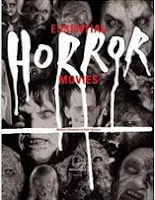Narrowing a century of horror cinema
down to 72 essential films is a goal doomed to fail. Genre fans tend to be
bloody-minded in more ways than one. We are a tough breed to please, and
Michael Mallory really stuck his hand into the monster’s mouth with his new
book Essential Horror Movies: Matinee
Monsters to Cult Classics. I can’t say that his selections totally defeated
my own bloody mindedness, but I can say that most of them fit the bill. While
I’d never argue that movies such as The
Last House on the Left, Friday the 13th,
or Saw are good, I will admit that
they are essential by representing major facets and turning points in horror history.
Some of his choices are more confounding. Since this book covers so few films,
I can’t understand how some of these made the cut (Polanksi’s beautifully shot
but dull and embarrassingly unfunny horror comedy The Fearless Vampire Killers; a film called Waxworks that I have not seen but does not really seem to qualify
as horror based on Mallory’s write-up;
The Beast with Five Fingers) while
others— such as The Black Cat, The Innocents, and Mamoulian’s Dr. Jekyll and Mr. Hyde (a shockingly
ahead-of-its-time film that Mallory criticizes for being more dated and less
grim than the silent version starring John Barrymore!) weren’t even in the running.
Mallory’s extended “Fifty Additional Horror Films Worth Seeing” list doesn’t
even sweep up the debris and contains a number of notorious stinkers (Roger
Corman’s The Terror, Son of Dracula, Count Yorga).
Of course, this is the kind of
reaction we serious horror freaks are supposed to have, and I’m sure there were
more than a few outraged reactions to my own 150 Essential Horror Movies series
from a few years back. I tried to make my list worth reading by writing what I
hoped were insightful readings of the films and their places in horror history.
This is also what Mallory did to make his cases, and although photos receive
pride of place in his coffee table book (and those images do make this a very
appealingly grotesque volume), his text is the real essential elements because
of its insights and its trivia, although I’d keep a wide birth when reading his
spoiler-sprinkled summaries of films you’ve never seen. I was actually
surprised that I’d never seen a handful of these (Waxworks, Mill of the Stone
Woman, Mark of the Wolfman), so
his book even fulfilled the purpose that all books and lists of this sort
should: convincing recommendations.

